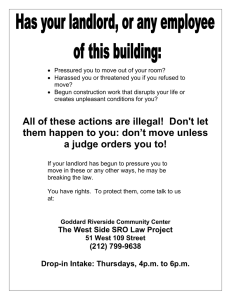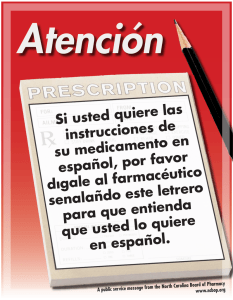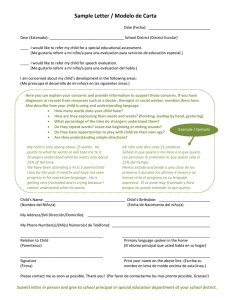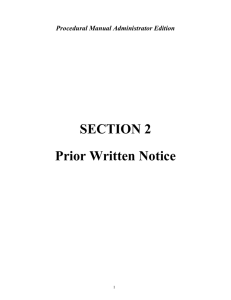The ABCs of the IEP Meeting: What a Parent Should Know
Anuncio
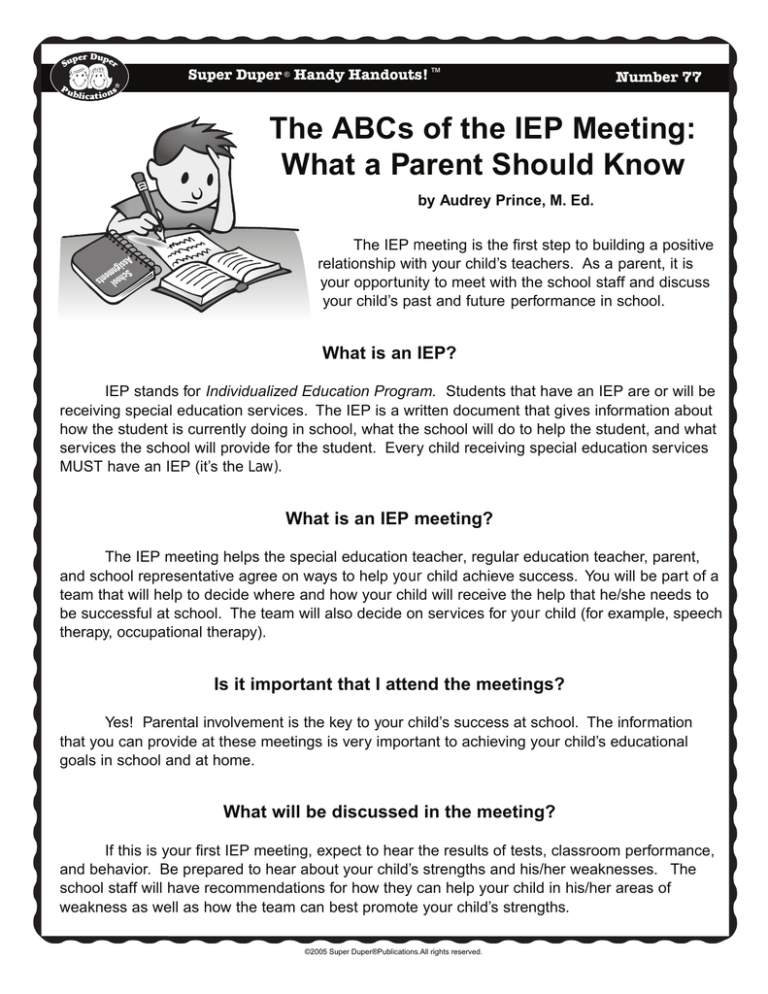
Super Duper ® Handy Handouts! ™ Number 77 The ABCs of the IEP Meeting: What a Parent Should Know by Audrey Prince, M. Ed. The IEP meeting is the first step to building a positive relationship with your child’s teachers. As a parent, it is your opportunity to meet with the school staff and discuss your child’s past and future performance in school. What is an IEP? IEP stands for Individualized Education Program. Students that have an IEP are or will be receiving special education services. The IEP is a written document that gives information about how the student is currently doing in school, what the school will do to help the student, and what services the school will provide for the student. Every child receiving special education services MUST have an IEP (it’s the Law). What is an IEP meeting? The IEP meeting helps the special education teacher, regular education teacher, parent, and school representative agree on ways to help your child achieve success. You will be part of a team that will help to decide where and how your child will receive the help that he/she needs to be successful at school. The team will also decide on services for your child (for example, speech therapy, occupational therapy). Is it important that I attend the meetings? Yes! Parental involvement is the key to your child’s success at school. The information that you can provide at these meetings is very important to achieving your child’s educational goals in school and at home. What will be discussed in the meeting? If this is your first IEP meeting, expect to hear the results of tests, classroom performance, and behavior. Be prepared to hear about your child’s strengths and his/her weaknesses. The school staff will have recommendations for how they can help your child in his/her areas of weakness as well as how the team can best promote your child’s strengths. l ©2005 Super Duper®Publications.All rights reserved. What should I do before the meeting? • If you cannot attend the meeting, call the school and ask to reschedule. • Write down questions that you have for the IEP team, as well as goals that you have for your child. This way you will not forget anything when you get to the meeting. • You are entitled to rec eive a copy of the proposed IEP documents prior to the meeting. Contact your child's special education teacher if you would like to obtain a copy. • Talk with your child about school and his/her desires for the future. What should I do during the meeting? • Be an active team member provide any information that you believe would help your child at school and home. • Ask Questions! Something you don’t understand, ask to have it explained. • Take notes. If both parents can attend or you can bring a friend or relative, have them take notes while you participate in the meeting. Remember, you will receive a lot of information at this meeting and it can be a little overwhelming. It will help if you have notes that you can review when you get home. • Remember, if you do not agree with the program, speak up and voice your concerns. • At the end of the meeting, you should receive a copy of your child’s IEP. What should I do after the IEP meeting? • File the Individualized Education Program (IEP) papers in one place. • Review the IEP throughout the year; make sure that the program is continuing to meet the needs of your child. • Continue the program at home. For example, if your child is learning to say the “r” sound in speech therapy, it is important that you continue practicing at home. • Help your child focus on abilities and progress, not grades. • Find activites that showcase your child’s strengths to help develop confidence. Name Date www.superduperinc.com Call 1-800-277-8737 FAX 1-800-978-7379 Order Anytime! ©2005 Super Duper®Publications.All rights reserved. Super Duper® Handy Handouts!® Número 77 Los ABCs de una reunión de IEP: Lo que los padres deben saber por Audrey Prince, M.Ed. La reunión de IEP es el primer paso en la construcción de una relación positiva con los maestros de su niño. Como padre, es su oportunidad para reunirse con el personal escolar y discutir la labor que su niño hizo en el pasado y hará en el futuro. ¿Qué es un IEP? Las letras IEP representan un Programa Individualizado de Educación. Estudiantes que tienen un IEP reciben o van ha recibir servicios de educación especial. El IEP es un documento escrito que provee información acerca de como el estudiante esta funcionando presentemente en la escuela, lo que la escuela hará para ayudar al estudiante, y cuales servicios la escuela le va a proveer al estudiante. Cada niño que recibe servicios de educación especial debe tener un IEP (es la ley). ¿Qué es una reunión de IEP? La reunión de IEP ayuda al maestro de educación especial, al maestro de educación regular, a los padres, y al representante escolar a llegar a un acuerdo sobre maneras de ayudar al niño a ser exitoso. Usted será parte de un equipo que ayudara a decidir dónde y cómo su niño va a recibir la ayuda que él/ella necesita para ser exitoso en su escuela. El equipo también decide cuales servicios su niño recibirá (por ejemplo, terapia del habla y/o terapia ocupacional). ¿Es importante que yo esté presente en la reunión? Sí, el involucro de los padres es la clave para el éxito escolar de su niño. La información que usted provee en estas reuniones es muy importante para lograr las metas educacionales de su niño en la escuela y en el hogar. ¿Qué se discutirá en la reunión? Si esta es su primera reunión de IEP, espere escuchar los resultados de las pruebas administradas, el trabajo hecho en el aula escolar, y el comportamiento. Prepárese a escuchar acerca de las fortalezas y debilidades de su niño. El personal escolar tendrá recomendaciones de como ellos ayudaran a su niño en áreas donde él o ella tiene debilidades, y como van a promover sus fortalezas. © 2009 Super Duper® Publications • www.superduperinc.com ¿Qué debo hacer antes de la reunión? • Si usted no puede estar presente en la reunión, llame la escuela y pida otra fecha. • Escriba preguntas que usted tiene para el equipo de IEP, y las metas que usted tiene para su niño. De esta manera usted no olvidara datos importantes cuando llegue a la reunión. • Usted tiene el derecho de recibir una copia de los documentos propuestos en el IEP antes de la reunión. Póngase en contacto con el maestro de educación especial si usted desea obtener una copia. • Hable con su niño acerca de la escuela y sus ambiciones para el futuro. ¿Qué debo hacer durante la reunión? • Sea un miembro activo del equipo proveyendo información que usted cree que le ayudara a su niño en la escuela y en el hogar. • ¡Haga preguntas! Si usted no entiende algo, pida que se lo expliquen. • Tome notas. Si ambos padres pueden estar presente o si usted puede traer un amigo o familiar, pídale que tomen notas mientras usted participa en la reunión. Recuerde que usted va a recibir mucha información en ésta reunión y esto puede ser un poco abrumador. El tener notas que usted pueda repasar cuando llegue a su hogar le ayudará. • Recuerde, si usted no esta de acuerdo con el programa, dígalo y exprese sus preocupaciones. • Al final de la reunión, usted debe recibir una copia del IEP de su niño. ¿Qué debo hacer después de la reunión de IEP? • Archive los papeles del Programa Individualizado de Educación (IEP) en un solo lugar. • Repase el IEP durante todo el año; asegúrese que el programa continúa cumpliendo las necesidades de su niño. • Continúe el programa en su hogar. Por ejemplo, si su niño está aprendiendo a pronunciar el sonido “r” en la terapia del habla, es importante que usted continúe la practica de ese sonido en su hogar. • Ayude a su niño a enfocarse en sus habilidades y progreso, no solamente en sus notas. • Busque actividades que realcen las fortalezas de su niño para que desarrolle confianza en sí mismo. © 2009 Super Duper® Publications • www.superduperinc.com


